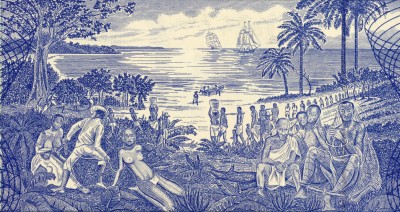The other week while on twitter one of my followers Sezoni Whitfield, mentioned she would do a Black History “fact” everyday of this month. With that I mentioned maybe doing a post each week during the month on the topic. By doing this, she unknowingly set the wheels in motion, and the more I thought of it the more it became a challenge; one that I will try my best to fulfill. As my first installment, I’d like to take on this question: What would it have been like being present for the emancipation proclamation speech? I assume you all know it – the oration by President Abraham Lincoln freeing the slaves.
Let me begin by saying, if I’m standing among the crowd there would definitely be many variables determining my understanding of the words. Think about it, there are so many people even today, who cannot comprehend legal jargon. Therefore, I think I can safely say, at least seventy percent (if not higher) of the slave population could not read or write. Consequently, as they listened – “That on the first day of January, in the year of our Lord one thousand eight hundred and sixty-three, all persons held as slaves within any State or designated part of a State, the people whereof shall then be in rebellion against the United States, shall be then, thenceforward, and forever free….” But, if nothing else, I could definitely hear myself repeating it – free. I can pretty much guarantee everyone listening even recognized it. I would then, without hesitation begin searching for the local slave who could read and write to translate the important parts to me; that is, if I’m not the one with those skills.
What would the words free or freedom mean to a slave. Someone plucked from the land of their birth; a native land were there had been no need to discuss anything to do with lack of restrictions. And why? Because they called those western shores of Africa home. In their own country they were able to come and go as needed or as desired, just as you or I can right now. But then, after being shackled, thrown onto a ship, exposed to inhumane treatment and conditions, and taken to a strange land – listening to that one utterance had to have bittersweet connotations. At this point in the game, they had no way to get back across the water to the Motherland, even if the desire moved the earth like a telekinetic earthquake.
If one researches the numbers, (Trans-Atlantic Slave Trade Database) you would think large amounts; an innumerable figure landed on these shores. If you thought that, however, you would be mistaken. It is noted between 1525 and 1866, 12.5 million souls were transported across the Atlantic. But, the majority of those people were taken to South America and the Caribbean. It is reported, an additional 10.7 million survived the Middle Passage, and again the majority went south of America. In all, a total of approximately 450,000 only, made it to these shores. When I look at those numbers, I find it remarkable that I’m not Brazilian or from some Caribbean island. I mean, really, think about it. The Middle Passage indentures’ were from: Senegambia, Upper Guinea, the Windward Coast, the Gold Coast, Bight of Benin, Bight of Biafra, West Central Africa and even as far as Southeast Africa. (A little plug here – I love Google Earth. It helped me get a first hand peek at the different regions.)
I, along with a nation watched Roots as Alex Haley’s story took shape on-screen. Even the Autobiography of Jane Pittman – it also portrayed the moment when the remark came down – FREE. After living as a slave for however long, would they just slowly turn and go back to their cabin – waiting for the next day, to rise and do the same thing they had done every other day? Or would a person immediately gather up all of their belongings and hit the dusty road? For me, I would definitely want to collect my entire family or whomever and make a plan. But, I recall a conversation with my mother – we knew without doubt that very early on, we would have met our end, because “subservient” has never been a part of my vocabulary. What does that mean? For me, I probably would have never made it to the Emancipation.
Now, if you’ve been reading my blog all along, you’ve heard me mention in passing, someone told me I had an African guardian angel. I would like to think I’m still connected to the Motherland through that spirit. And, I probably am, because every time I give any deep thought to the issue, there is always a desperate tug at my heart. Well, that’s all for today, but make certain to come back next week as we take on another issue surrounding Black History.
Information provided through Wikipedia and Trans-Atlantic slave Trade Database
Image courtesy of 123rf
